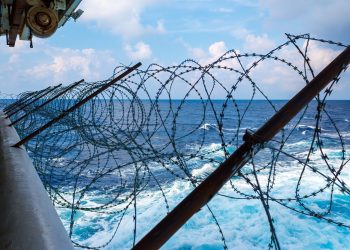During the 2023 GREEN4SEA Athens Forum, Mrs. Maria Tsompanoglou, Energy Performance Manager, Pantheon Tankers Management Ltd, presented an overview of the impact of specific energy-saving technologies on the EEXI & CII for large tankers and bulk carriers. The presentation focused on the most widely known energy-saving technologies that are already widespread in the market and have proven their effectiveness: pre-swirl stators, PBCFs and low-friction coatings.
With the International Maritime Organization (IMO) enforcing a 40% reduction in carbon emissions by 2030 and a 70% reduction in 2025, older vessels will have a tough time meeting and complying with these requirements.
Most vessels over ten years old require a very large power limitation in order to comply with the EEXI (Energy Efficiency Existing Ship Index) regulation. In addition, their CII (Carbon Intensity Indicator) rating ranges and fluctuates around the rating of C or marginal D.
The energy saving upgrade of these vessels is the way to go and the obvious solution to improve their performance. This should happen not simply to comply with rules, but also to make them more commercially appealing, as in order to achieve the prescribed EEXI levels, they may need to considerably limit their maximum delivered speed.
Energy-saving technologies
The easy-to-retrofit, cost-effective and widely spread to the market technology that this article will focus on are:
- Propeller boss cap fins (PBCF)
- Pre-swirl stators/ducts (PSD)
- Low-friction hull coatings
All of these systems necessitate dry/dock, but they are not difficult to adapt in their installation. Furthermore, they have demonstrated a very quick pay-back rate (1,5 – 2,5 years), especially when coupled. In addition, charterers show a very high preference to the vessels which have been energy-upgraded.
Energy Saving Upgrades impact on EEXI
Factual data from upgrades on large bulk carriers and tankers:
- Combination of Pre-swirl Duct & Low-Friction Coating provided 7-9% power saving, or 0.3 – 0.4kn speed increase
- Combination of PBCF, Pre-swirl Duct & Low-Friction Coating provided >10% power saving, or 0.5 – 0.7kn speed increase
- Upgrade led to less engine power limitation for EEXI compliance, meaning that max delivered speed was not affected, or it was limited affected.
- For initial EPL 32-35%, Case 1 decreased required EPL to 28-30% approxly, whereas Case-2 decreased required EPL to 26-28% approxly – max delivered speed after upgrade & EPL remained ≥ 13.5kn
Energy Saving Upgrades impact on CII
The impact of the energy-saving upgrades on CII compliance cannot be clearly defined a priori because the CII is an operational indicator that is heavily dependent on the vessel’s sailing activity.
Higher sailing activity translates to more distance travelled and to a better CII. When sailing activity is low, the share of laden and ballast days becomes particularly important.
Important notes with regards to the impact on CII of the energy-saving upgrades:
- Pre-swirl ducts provide their full saving potential when fully submerged – the more submerged the better. If not fully submerged, they may cause more harm than good.
- Therefore, in several installations, ballast legs must be performed in heavy ballast draft, however, extra ballasting is not always feasible, especially during short ballast voyages.
As a result, it may appear the laden legs to be comparatively more efficient than the ballast ones.
Case study of CII Impact Evaluation
To understand the impact on CII by retrofitting of energy saving technologies, different operational scenarios of a vessel’s annual sailing activity have been perused as follows:
Assumptions:
- Capesize bulker of 179000Dwt, built 2011, trading worldwide
- Energy saving upgrade in year 2022
- Average annual weather condition: BF5/Swell 2m
- LFO (light fuel oil) in sailing (Cf=3.151), MGO (marine gas oil) in port (Cf=3.206)
- CII reduction factor 2% for the year of 2027 to 2030
- Laden voyages in full scantling draft
- Ballast voyages in heavy ballast draft
- Post-upgrade fuel saving about 2mt per day, either in laden or in ballast condition
Variables:
- Sailing activity i.e. total sailing days per year
- Share of Ballast vs Laden days
- Ballast and Laden speeds
The operational scenarios do not consider the possible negative impact of:
- Hull/engine underperformance and extreme weather conditions
- Changes in freight market that may impose different sailing speeds
- Higher CII reduction factors >2% for the years of 2027 to 2030
Results – How CII extends in the years
Operational Scenarios & CII Compliance Extension

Even in high-sailing-activity scenarios, 2030 looks to be the upper limit for CII compliance, considering the maximum to be the third year with a D grade, when a corrective action plan for additional energy saving measures should be established.
Biofuels may be included in the action plan, it should be highlighted, however, that the regulatory framework for biofuels is still in the works. Furthermore, the availability of biofuel is dubious, and the carbon factor varies depending on the bio-portion and origin.
Assuming bio-blends are properly regulated and used instead of the conventional HFO, LFO and MGO grades, compliance may be extended after 2030 with a sharp CII rating improvement regardless of the sailing activity.
Questionable measures for CII improvement
- Increased ballast sailing
As it is not a significant extension in CII compliance (only one year as per Scenario 3) and not a profitable option, it is not commercially desired. Owners and Charterers are working for as many laden legs as possible and need maximization of the laden voyages.
- Reduced speed (slow steaming)
Sailing speed is determined by the cargo transportation demand. Ship operators will not reduce speed just to improve CII if the transportation demand, and consequently the freight rates, are high.
- Additional point of consideration
Charterers do not appear to penalize vessels with D and E scores, at least for now.
Conclusions
Vessels over ten years old will be out of CII compliance by 2027 or earlier if no upgrades are made. Energy-saving upgrades can help to extend compliance by one to three years.
While the usage of biofuels may be advantageous, it is not without its drawbacks.
Also, compliance is heavily reliant on the CII reduction factors beyond 2027, which have yet to be determined.
CII Rating is tightly bonded with the sailing activity, which if low, the energy-saving technologies may not support compliance.
Finally, the volatility of the charter market may create difficulties in the CII compliance, especially for the older vessels.
Above article has been edited from Mrs. Maria Tsompanoglou’s presentation during the 2023 GREEN4SEA Athens Forum.
Explore more by watching her video presentation here below
The views presented are only those of the author and do not necessarily reflect those of SAFETY4SEA and are for information sharing and discussion purposes only.































































